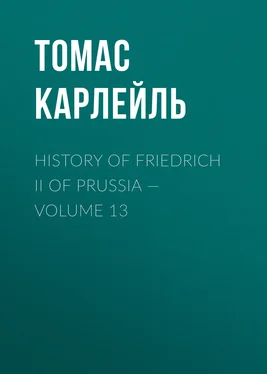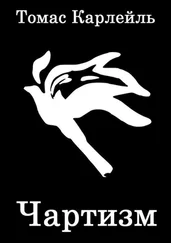Томас Карлейль - History of Friedrich II of Prussia — Volume 13
Здесь есть возможность читать онлайн «Томас Карлейль - History of Friedrich II of Prussia — Volume 13» — ознакомительный отрывок электронной книги совершенно бесплатно, а после прочтения отрывка купить полную версию. В некоторых случаях можно слушать аудио, скачать через торрент в формате fb2 и присутствует краткое содержание. Жанр: foreign_prose, История, literature_19, foreign_edu, foreign_antique, на английском языке. Описание произведения, (предисловие) а так же отзывы посетителей доступны на портале библиотеки ЛибКат.
- Название:History of Friedrich II of Prussia — Volume 13
- Автор:
- Жанр:
- Год:неизвестен
- ISBN:нет данных
- Рейтинг книги:5 / 5. Голосов: 1
-
Избранное:Добавить в избранное
- Отзывы:
-
Ваша оценка:
- 100
- 1
- 2
- 3
- 4
- 5
History of Friedrich II of Prussia — Volume 13: краткое содержание, описание и аннотация
Предлагаем к чтению аннотацию, описание, краткое содержание или предисловие (зависит от того, что написал сам автор книги «History of Friedrich II of Prussia — Volume 13»). Если вы не нашли необходимую информацию о книге — напишите в комментариях, мы постараемся отыскать её.
History of Friedrich II of Prussia — Volume 13 — читать онлайн ознакомительный отрывок
Ниже представлен текст книги, разбитый по страницам. Система сохранения места последней прочитанной страницы, позволяет с удобством читать онлайн бесплатно книгу «History of Friedrich II of Prussia — Volume 13», без необходимости каждый раз заново искать на чём Вы остановились. Поставьте закладку, и сможете в любой момент перейти на страницу, на которой закончили чтение.
Интервал:
Закладка:
"CAMP OF GROTKAU, 8th JUNE. Hyndford and Ginkel [the same respectable old Ginkel whom we used to know in Friedrich Wilhelm's time], having, according to renewed order, got out from Breslau with that formidable Dutch-English 'Advice' or Joint-Exhortation in their pocket, did this day in the Camp at Grotkau present the same. A very mild-spoken Piece, though it had required such courage; and which is not now worth speaking of, things having gone as we see. Friedrich received it with a gracious mien: 'Infinitely sensible to the trouble his Britannic Majesty and their High Mightinesses took with his affairs; Document should receive his best consideration,'—which indeed it has already done, and its Answer withal: A FRENCH Treaty signed three days ago, in virtue of it! 'Might I request a short Private Audience of your Majesty?' solicits Hyndford, intending to modify by new assurances, as bidden.—'Surely,' answers Friedrich.
"The two Excellencies dine with the King, who is in high spirits. After dinner, Hyndford gets his Private Audience; does his best in the way of 'new assurances;' which produce what effect we can fancy. Among other things, he appeals to the King's 'magnanimity, how grand and generous it will be to accept moderate terms from Austria, to—' KING (interrupting): 'My Lord, don't talk to me of magnanimity, a Prince [acting not for himself but for his Nation] ought to consult his interest in the first place. I am not against Peace: but I expect to have Four Duchies given me.'" [State-Paper Office (Hyndford, Breslau, 12th June, 1741).]
Hyndford and Ginkel slept that night in Grotkau Town: "at 4 next morning the King sent us word, That if we had a mind to see the Army on march," just moving off, Strehlen way, "we might come out by the North Gate." We accordingly saw the whole Army leave Camp; and march in four columns towards Friedewald, where Marshal Neipperg is encamped. "Not a bit of it, your Excellency! Neipperg is safe at Neisse; amid inaccessible embankments and artificial mud: and these are mere Hussar-Pandour rabble out here; whom a push or two sends home again,—would it could keep them there! But they are of sylvan (or SALVAGE) nature, affecting the shade; and burst out, for theft and arson, sometimes at great distances, no calculating where. The King's Army lay all that night upon their arms, and encamped next morning, the 10th. I believe nothing happened that day, for we were obliged to stay at Grotkau, for want of post-horses, a good part of it."
Hyndford hears (in secret Opposition Circles, and lays the flattering unction to his soul and your Lordship's): "The King of Prussia's Army, as I am informed, unless he will take counsel, another campaign will go near to ruin. Everything is in the greatest disorder; utmost dejection amongst the Officers from highest to lowest;"—fact being that the King has important improvements and new drillings in view (to go on at Strehlen), Cavalry improvements, Artillery improvements, unknown to Hyndford and the Opposition; and will not be ruined next campaign. "I hope the news we have here, of the taking of Carthagena, is true," concludes he. Alas, your Excellency!
By a different hand, from the southward Hungarian regions, far over the Hills, take this other entry; almost of enthusiastic style:—
"PRESBURG, 25th JUNE. Maria Theresa, in high spirits about her English Subsidy and the bright aspects, left Vienna about a week ago for Presburg [a drive of fifty miles down the fine Donau country]; and is celebrating her Coronation there, as Queen of Hungary, in a very sublime manner. Sunday, 25th June, 1741, that is the day of putting on your Crown,—Iron Crown of St. Stephen, as readers know. The Chivalry of Hungary, from Palfy and Esterhazy downward, and all the world are there; shining in loyalty and barbaric gold and pearl. A truly beautiful Young Woman, beautiful to soul and eye, devout too and noble, though ill-informed in Political or other Science, is in the middle of it, and makes the scene still more noticeable to us. See, as the finish of the ceremonies, she has mounted a high swift horse, sword girt to her side,—a great rider always, this young Queen;—and gallops, Hungary following like a comet-tail, to the Konigsberg [KING'S-HILL so called; no great things of a Hill, O reader; made by barrow, you can see], to the top of the Konigsberg; there draws sword; and cuts, grandly flourishing, to the Four Quarters of the Heavens: 'Let any mortal, from whatever quarter coming, meddle with Hungary if he dare!' [Adelung, ii. 293, 294.] Chivalrous Hungary bursts into passionate acclaim; old Palfy, I could fancy, into tears; and all the world murmurs to itself, with moist-gleaming eyes, 'REX NOSTER!' This is, in fact, the beautifulest King or Queen that now is, this radiant young woman; beautiful things have been, and are to be, reported of her; and she has a terrible voyage just ahead,—little dreaming of it at this grand moment. I wish his Britannic Majesty, or Robinson who has followed out hither, could persuade her to some compliance on the Silesian matter: what a thing were that, for herself, and for all mankind, just now! But she will not hear of that; and is very obstinate, and her stupid Hofraths equally and much more blamably so. Deaf to hard Facts knocking at their door; ignorant what Noah's-Deluges have broken out upon them, and are rushing on inevitable."
By a notable coincidence, precisely while those sword-flourishings go on at Presburg, Marechal Excellency Belleisle is making his Public Entry into Frankfurt-on-Mayn: [25th June, 1741 (Adelung, ii. 399).] Frankfurt too is in cheery emotion; streets populous with Sunday gazers, and critics of the sublime in spectacle! This is not Belleisle's first entrance; he himself has been here some time, settling his Household, and a good many things: but today he solemnly leads in his Countess and Appendages (over from Metz, where Madame and he officially reside in common times, "Governor of Metz," one of his many offices);—leads in Madame, in suitably resplendent manner; to kindle household fire, as it were; and indicate that here is his place, till he have got a Kaiser to his mind. Twin Phenomena, these two; going on 500 miles apart; unconscious of one another, or of what kinship they happen to have!—
EXCELLENCY ROBINSON BUSY IN THE VIENNA HOFRATH CIRCLES, TO PRODUCE A
COMPLIANCE
Britannic George, both for Pragmatic's sake and for dear Hanover's, desires much there were a bargain made with Friedrich: How is the Pragmatic to be saved at all, if Friedrich join France in its Belleisle machinations, thinks George? And already here is that Camp of Gottin, glittering in view like a drawn sword pointed at one's throat or at one's Hanover. Nay, in a month or two hence, as the Belleisle schemes got above ground in the shape of facts, this desire became passionate, and a bargain with Prussia seemed the one thing needful. For, alas, the reader will see there comes, about that time, a second sword (the Maillebois Army, namely), pointed at one's throat from the French side of things: so that a Paladin of the Pragmatic, and Hanoverian King of England, knows not which way to turn! George's sincerity of wish is perhaps underrated by Friedrich; who indeed knows well enough on which side George's wishes would fall, if they had liberty (which they have not), but much overrates "the astucity" of poor George and his English; ascribing, as is often done, to fine-spun attorneyism what is mere cunctation, ignorance, negligence, and other forms of a stupidity perhaps the most honest in the world! By degrees Friedrich understood better; but he never much liked the English ways of doing business. George's desire is abundantly sincere, not wholly resting on sublime grounds; and grows more and more intense every day; but could not be gratified for a good while yet.
Co-operating with Hyndford, from the Vienna side, is Excellency Robinson; who has a still harder job of it there. Pity poor Robinson, O English reader, if you can for indignation at the business he is in. Saving the Liberties of Europe! thinks Robinson confidently: Founding the English National Debt, answers Fact; and doing Bottom the Weaver, with long ears, in the miserablest Pickleherring Tragedy that ever was!—This is the same Robinson who immortalized himself, nine or ten years ago, by the First Treaty of Vienna; thrice-salutary Treaty, which DISJOINED Austria from Bourbon-Spanish Alliances, and brought her into the arms of the grateful Sea-Powers again. Imminent Downfall of the Universe was thus, glory to Robinson, arrested for that time. And now we have the same Robinson instructed to sharpen all his faculties to the cutting pitch, and do the impossible for this new and reverse face of matters. What a change from 1731 to 1741! Bugbear of dreadful Austrian-Spanish Alliance dissolves now into sunlit clouds, encircling a beautiful Austrian Andromeda, about to be devoured for us; and the Downfall of the Universe is again imminent, from Spain and others joining AGAINST Austria. Oh, ye wigs, and eximious wig-blocks, called right-honorable! If a man, sovereign or other, were to stay well at home, and mind his own visible affairs, trusting a good deal that the Universe would shift for itself, might it not be better for him? Robinson, who writes rather a heavy style, but is full of inextinguishable heavy zeal withal, will have a great deal to do in these coming years. Ancestor of certain valuable Earls that now are; author of immeasurable quantities of the Diplomatic cobwebs that then were.
Читать дальшеИнтервал:
Закладка:
Похожие книги на «History of Friedrich II of Prussia — Volume 13»
Представляем Вашему вниманию похожие книги на «History of Friedrich II of Prussia — Volume 13» списком для выбора. Мы отобрали схожую по названию и смыслу литературу в надежде предоставить читателям больше вариантов отыскать новые, интересные, ещё непрочитанные произведения.
Обсуждение, отзывы о книге «History of Friedrich II of Prussia — Volume 13» и просто собственные мнения читателей. Оставьте ваши комментарии, напишите, что Вы думаете о произведении, его смысле или главных героях. Укажите что конкретно понравилось, а что нет, и почему Вы так считаете.









